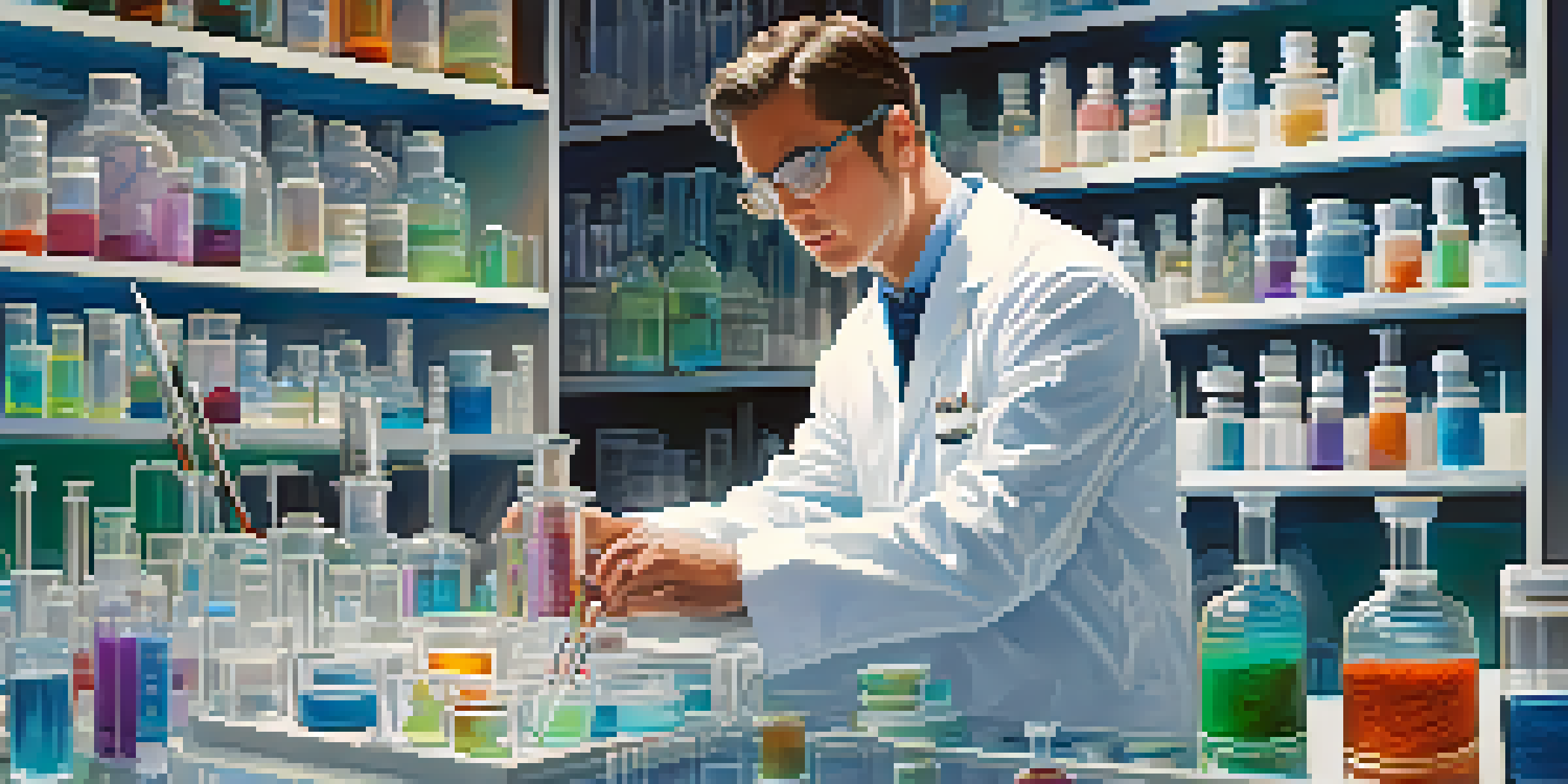Biologics and Biosimilars: Understanding Their Role in Therapy

What Are Biologics and Biosimilars?
Biologics are medical products made from living organisms, and they include a wide range of products such as vaccines, blood components, and gene therapies. Unlike traditional drugs that are chemically synthesized, biologics are typically more complex in structure and function. On the other hand, biosimilars are highly similar versions of already approved biologics, designed to have no clinically meaningful differences in terms of safety, effectiveness, or quality.
Biologics have the potential to change the standard of care for many diseases, offering targeted therapies that are more effective and have fewer side effects.
Understanding the distinction between biologics and biosimilars is crucial for both healthcare professionals and patients. While biologics can offer innovative treatments for various diseases, biosimilars provide a more cost-effective alternative, making treatments accessible to a broader population. This growing market is reshaping the landscape of medicine, giving patients more options when it comes to their therapy.
The development of biologics and biosimilars has been driven by advancements in biotechnology, leading to breakthroughs in treating chronic conditions like cancer, autoimmune disorders, and more. As we dive deeper into this topic, we'll explore the roles these therapies play in patient care and how they are changing the way we approach treatment.
The Importance of Biologics in Modern Medicine
Biologics have revolutionized the treatment of various diseases, offering targeted therapies that can provide significant benefits for patients. For instance, monoclonal antibodies, a type of biologic, are used to treat cancers and autoimmune diseases by specifically targeting disease-causing cells. This precision in treatment not only improves outcomes but also reduces side effects compared to traditional therapies.

In addition to cancer and autoimmune diseases, biologics have made a significant impact in treating rare diseases, such as hemophilia and certain genetic disorders. These therapies can replace deficient or dysfunctional proteins, ultimately improving the quality of life for patients. The ability to tailor treatments to individual patient needs is a hallmark of biologics that sets them apart from conventional medications.
Biologics Revolutionize Disease Treatment
Biologics offer targeted therapies that significantly improve patient outcomes for various diseases, including cancer and autoimmune disorders.
As we witness the continuous evolution of biologics, their role in personalized medicine becomes increasingly evident. This approach means that treatments can be customized based on a patient's specific genetic makeup and disease profile, leading to more effective and safer therapeutic options.
Biosimilars: A Game Changer for Healthcare Costs
Biosimilars have emerged as a crucial player in the healthcare system, primarily due to their potential to lower treatment costs. By providing a similar yet more affordable alternative to established biologics, biosimilars can significantly reduce the financial burden on patients and healthcare providers. This is particularly important given the high cost of many biologic therapies, which can limit access for those in need.
Biosimilars are not just a cost-saving alternative; they represent an opportunity to expand access to life-saving therapies for patients worldwide.
The introduction of biosimilars into the market encourages competition, leading to price reductions and greater availability of treatment options. Patients who previously faced challenges affording their medications may find relief through these alternatives. Additionally, healthcare systems can allocate resources more effectively, allowing for broader access to innovative therapies.
Moreover, the approval process for biosimilars is designed to ensure that they meet stringent regulatory standards, providing confidence in their safety and efficacy. This means that patients can trust that they are receiving high-quality care, even with a more cost-effective option.
Regulatory Framework for Biologics and Biosimilars
The approval and regulation of biologics and biosimilars are critical to ensure patient safety and treatment effectiveness. In the United States, the FDA oversees the approval of these products, employing a rigorous review process that assesses their quality, safety, and efficacy. This process involves extensive clinical trials and data analysis to confirm that biologics and biosimilars meet the necessary standards.
Internationally, regulatory bodies such as the European Medicines Agency (EMA) also have established guidelines for the approval of biologics and biosimilars. These regulations are designed to ensure that products maintain consistency in their performance and safety profiles, regardless of the manufacturer. This is particularly important for biosimilars, as they must demonstrate similarity to their reference biologic without compromising quality.
Biosimilars Lower Healthcare Costs
Biosimilars provide a more affordable alternative to biologics, making innovative treatments accessible to a broader patient population.
Understanding the regulatory landscape is essential for healthcare providers, as it helps them make informed decisions about treatment options. As the market for biologics and biosimilars continues to grow, staying updated on regulations ensures that patients receive the best possible care.
The Role of Biologics in Targeted Therapy
One of the most appealing aspects of biologics is their role in targeted therapy, which focuses on specific pathways involved in disease progression. For instance, in cancer treatment, biologics can target specific proteins or receptors that are overactive in tumor cells, which can lead to more effective treatment with fewer side effects. This targeted approach contrasts with traditional chemotherapy, which often affects healthy cells as well.
Targeted therapies have shown remarkable success in treating certain types of cancers, such as breast and lung cancer, where specific biologics have been developed for tailored treatment plans. The ability to customize therapy based on the molecular characteristics of a patient's tumor represents a significant advancement in oncology. This shift toward personalized medicine is not only more effective but also enhances patient satisfaction and adherence to treatment.
As more research is conducted in this area, we can expect further innovations in biologics that will enhance their role in targeted therapy. This evolution will likely lead to even more precise treatments, improving outcomes for patients with complex health conditions.
Challenges in the Biologics and Biosimilars Market
Despite the benefits of biologics and biosimilars, the market is not without its challenges. One significant concern is the complexity of developing and manufacturing these products. Biologics are inherently more difficult to produce than traditional drugs, as even minor variations in the manufacturing process can affect the final product's safety and efficacy. This complexity contributes to higher development costs and longer timelines.
Additionally, there are ongoing concerns regarding the interchangeability of biologics and biosimilars. While biosimilars are designed to be similar to their reference products, some healthcare providers and patients may be hesitant to switch from an established biologic to a biosimilar. Education and transparency regarding the safety and effectiveness of biosimilars are essential to alleviate these concerns and encourage broader adoption.
Regulatory Oversight Ensures Safety
The rigorous regulatory framework governing biologics and biosimilars ensures their safety and effectiveness, fostering trust among patients and healthcare providers.
Lastly, market access and reimbursement policies can pose obstacles for biosimilars, impacting their availability and affordability. Stakeholders must collaborate to address these challenges and ensure that patients can benefit from the cost savings and improved access that biosimilars can provide.
The Future of Biologics and Biosimilars
Looking ahead, the future of biologics and biosimilars appears promising, with ongoing research and development paving the way for new therapeutic options. Advances in biotechnology and genomics are expected to lead to the discovery of novel biologics that can target previously untreatable conditions. As our understanding of disease mechanisms continues to evolve, so too will the opportunities for innovation in this field.
Moreover, the increasing acceptance of biosimilars by healthcare providers and patients is likely to drive market growth. As more biosimilars enter the market, competition will foster further price reductions, making treatments more accessible to diverse populations. This trend aligns with the global push towards more sustainable healthcare systems that prioritize patient-centric care.

Overall, the ongoing evolution of biologics and biosimilars has the potential to reshape the landscape of modern medicine. By fostering innovation, improving access, and enhancing treatment outcomes, these therapies will continue to play a vital role in addressing the healthcare needs of the future.